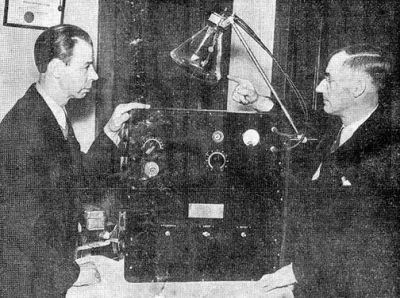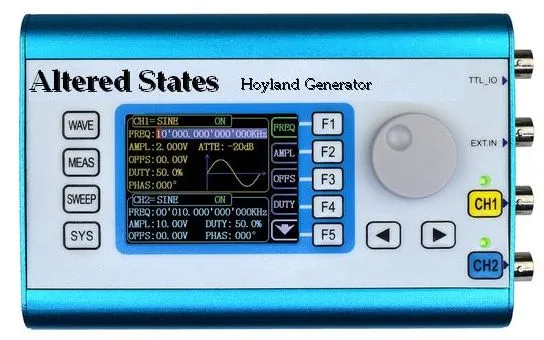The Contributions
of Philip Hoyland and Royal Rife to Frequency Medicine.
Introduction

Royal Rife built 5 different Rife machines,
Rife Ray (Beamray) # 1,2, 3, 4 and 5.
Rife Ray # (Beamray) 1-4 were designed by Royal Rife and
John Crane.. Rife Ray # 5 which was the most popular Rife
machine amongst doctors and practitioners Designed and
built by Philip Hoyland and Royal Rife. This was by far
the most popular and effective Rife machne ever built.
If you look near the bottom of this page, you will see
the Rife Pro options 2H to 7H The "H" stands
for Hoyland, These are the only units in the world that
that include the functions of the Rife Ray # 1,2, 3, 4,
and recognise and use the Rife Ray # 5, a Combination of
Royal Rife and Philip Hoylands pure genius..
| As for the search for truth, I know from my own
painful searching, with its many blind alleys, how
hard it
is to take a reliable step, be it ever so small, towards
the understanding of that which is truly significant.
Albert Einstein
|
The field of frequency medicine, which involves using
electromagnetic frequencies to treat diseases, owes much
to the pioneering efforts of Royal
Raymond Rife and Philip Hoyland. Rife, an American
inventor and early proponent of this Frequency based
approach, developed technologies
that he believed could destroy pathogens using their specific
resonant frequencies. Philip Hoyland, a lesser-known
but crucial collaborator, played a significant role in
refining Rife's inventions and ensuring their practical
application. This Newsletter explores the contributions
of both men to the development of Rife machines and the
broader field of frequency medicine.

The Science Behind the Machines
Rife and Hoyland's work is based on the principle of resonance.
By identifying the Mortal Oscillatory Rate (MOR) of a pathogen,
their machines could generate the frequency and Harmonics
needed to disrupt the pathogen’s structure. This
method, similar to how a soprano’s voice can shatter
glass, proved to be a revolutionary approach to treating
infections
and diseases, including Tumors.
Royal Raymond Rife: The Visionary

Early Life and Innovations
The Origins
Royal Rife was a pioneer in the early 20th century,
developing the Rife Machine to target and destroy pathogens
with resonant frequencies. His meticulous research led
to the discovery that each microorganism has a unique
frequency, and when matched, it could be eradicated without
harming surrounding tissues.
Royal Rife was born in 1888 in Elkhorn, Nebraska. His
early career was marked by a fascination with microscopes
and optics, which eventually led him to invent the Rife
microscope. This device purportedly allowed him to observe
live viruses and bacteria at magnifications far greater
than what was possible with conventional microscopes
of his time.
The Rife Machine
Rife's
most famous invention, the Rife machine, was
based on the principle of resonant frequencies. He theorized
that each microorganism had a specific frequency at which
it could be destroyed. By subjecting pathogens
to their respective "Mortal Oscillatory Rate" (MOR)
using his Rife frequency generator, Royal Rife claimed
he could eliminate them without harming the surrounding
tissues.
His initial successes included the reported destruction
of the Bacillus coli and other pathogens.
In a two-part article written by Newall
Jones of the San Diego Evening Tribune (May 6 & 11), Royal
Rife said, ‘We do not wish at this time to
claim that we have "cured" cancer, or any
other disease, for that matter. But we can say that
these waves, or this ray, as the frequencies might
be called, have been shown to possess the power of
devitalizing disease organisms, of "killing" them,
when tuned to an exact wave length, or frequency,
for each organism. This applies to the organisms
both in their free state and, with certain exceptions,
when they are in living tissues.’"
Royel Rife in his own words |
Controversies and Challenges

Despite early successes, Rife's work was met with skepticism
and controversy. The medical establishment and mainstream
scientists criticized his lack of rigorous clinical trials
and reproducible results.
The AMA: aggressively opposed the technology only after
its chairman's attempt to buy the rights to it was rejected
(what a coincidence!)
Dr. Morris Fishbein (1889-1976) originally studied to
be a clown. Realizing he could make more money as a doctor,
he entered medical school (where he failed anatomy),
then barely graduated. He never treated a patient in
his life.
Why is he so important? Because he became head of the
AMA, a position that he used to enrich himself and crush
legitimate therapies out of existence. He appeared to
be motivated solely by money and power. More on Morris
Fishbein and the AMA

Fishbein is reported to have done something
similar to Harry Hoxsey for his herbal
cancer
remedy.(which Fishbein, in court, had to admit worked
on skin cancer):.Fishbein and his associates
would receive all profits for nine years and Hoxey
would receive nothing.
Then,
if they were satisfied that it worked, Hoxsey would begin
to receive 10% of the profits. When Hoxsey refused,
Fishbein used his political connections to have Hoxsey
arrested
125 times in a period of 16 months. The charges
(based on practicing without a license) were always thrown
out
of court, but Fishbein (AMA) harassed Hoxsey for 25 years.
The only good thing that came out of it is that the
scandal forced Fishbein to resign. by Bob Wallace

Collaboration with Rife
Philip Hoyland, an electrical engineer, became involved
with Rife's work in the 1930s. Hoyland's technical expertise
was instrumental in refining the design and functionality
of the Rife machine. He helped Rife develop more
sophisticated frequency generators, which improved
the precision and efficacy of the treatments. Hoyland's
key contribution was the development of the Beam Ray
Rife machine, a device capable of producing a range of
frequencies simultaneously. This advancement allowed
for more effective
targeting of pathogens and expanded the potential applications
of Royal Rife’s discoveries.
| "Philip Hoyland was able to produce all
of Dr. Rife's frequencies, through harmonic sideband
frequencies, using these audio frequencies because
he found that Dr. Rife was correct when he said that
many of his frequencies were harmonics (actually
Dr. Rife meant sub-harmonics of higher frequencies). |
"None of Dr. Rife's previous instruments ever had
the capability that this new instrument had.. Dr. Johnson
pointed this fact out in his letter. "The major
difference between this new Rife Ray #5 Clinical instrument
and Dr. Rife's previous instruments
is the fact that this new instrument could produce over
one hundred harmonic side bands simultaneously. It was
this new harmonic sideband capability in this Rife|_hoyland
Clinical instrument which makes this sweep we
are
discussing
on this page possible."
.webp)
Old |

New |
Engineering Contributions
Hoyland's most notable contribution being the development
of the Rife Beam Ray device, a more advanced and reliable
version of Rife's original machine. This device was designed
to be used by physicians and practitioners, making Rife's
technology more accessible and practical for clinical
use.
Re the Rife-Hoyland Machine
"I can assure you that no one, not even myself,
could help but be astounded at the results we are
now obtaining with the assistance of our new machines
and our new band of MOR's.(Mortal oscillatory rate)" (Letter
from Dr. Johnson to Dr. Gruner (copy sent to
Dr. Rife) dated, November 4, 1936." |
Science Proves Royal Rifes protocols
An Article from PubMed Central-NIH National Library
of Medicine on Targeted treatment of cancer with radiofrequency
electromagnetic fields amplitude-modulated at tumor-specific
frequencies Source

Mainstream Science Validates Rife Machines and Rife
frequencies
An excerpt from a massive study conducted by the Department
of Biomedical Engineering, NovoCure Ltd., Haifa, Israel;
B. Rappaport Faculty of Medicine, Technion—Israel
Institute of Technology, Haifa, Israel; Department of
Molecular Cell Biology, Weizmann Institute of Science,
Rehovot, Israel; and Elisha Medical Centre, Haifa, Israel. Disruption of Cancer Cell Replication by Alternating
Electric Fields
At 24 hrs after exposure, concentration of
leukemia cells exposed to the electric current
was only 58%
of that of non-exposed leukemia cells. Narendra P.
Singh and Henry Lai
Department of Bioengineering
University of Washington
Seattle, WA Source |
Enduring Impact
Despite the controversies and challenges, the work of
Rife and Hoyland has had a lasting impact on the field
of alternative medicine. Many
modern practitioners and researchers continue to explore
the potential of frequency
medicine, building on the foundations laid by these pioneers.
Scientific Reassessment
Recent advances in technology and a growing interest
in alternative therapies have prompted a reassessment
of Rife's and Hoyland's work. While mainstream acceptance
remains limited, there is a renewed interest in studying
the potential of frequency-based therapies. Modern
researchers are investigating the underlying mechanisms of action
and conducting more rigorous clinical trials to validate
the efficacy of these treatments.

Conclusion
Royal Raymond Rife and Philip Hoyland were pioneers
whose innovative work in frequency medicine has left
an indelible mark on the field. Rife's visionary concepts
and Hoyland's engineering expertise combined to create
technologies that challenged conventional medical paradigms.
Despite the controversies and challenges they faced,
their legacy continues to inspire a new generation of
researchers and practitioners exploring the therapeutic
potential of electromagnetic frequencies. As science
and medicine evolve, the contributions of Rife and Hoyland
may yet find their place in the broader tapestry of medical
innovation.
Stay Updated
For the latest insights into alternative health technologies
and innovative wellness solutions, subscribe to our newsletter.
Stay informed and explore new ways to support your well being. Click
Here |

